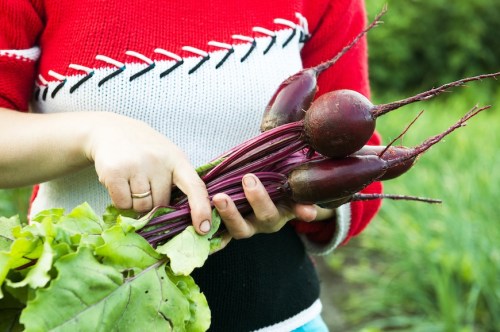Our editors independently select these products. Making a purchase through our links may earn Well+Good a commission
It took me a long time, but I actually like beets now—which is fortuitous, because they are packed with nutrients. Doesn’t hurt that they’ve become super trendy too. Wellness-forward cities like Los Angeles and New York even have coffee shops offering up beet lattes, which inevitably end up all over Instagram. (So pink! So pretty!)
But back to those nutrients. What exactly is it about beets that make them such a wellness win? Keep reading for all the intel.
What are the health benefits of beets?
1. They offer some bone-building calcium. If you’re dairy-free, beets are another vegetable that can help you get towards your daily calcium totals with 22 milligrams per cup. That’s about 2 percent of your recommended daily intake, so don’t consider them your sole source—but they could be a nice addition to other vegan sources like tofu and collard greens.
2. Beets are good for your gut. “Beets are full of fiber,” says registered dietitian Mary Ellen Phipps, MPH, RDN, LD, the founder of Milk & Honey Nutrition. You get four grams of fiber per cup. (Note: To really get these benefits, eat the actual beet as opposed to consuming it as a juice or latte.) This is great news for your body because a high-fiber diet supports good gut health, metabolism, and healthy weight management.
3. Beets have folate. Phipps also points out that beets are a good source of folate, which is good for your heart. If you have a history of cardiovascular disease in your family—or it’s something your doctor has said to be conscious of—beets are a great veggie to incorporate into more of your meals. It’s also important for fetal development and healthy hair growth.
4. They have magnesium. If you’re more into getting vitamins from food than supplements or products, beets might be a way for you to get your stress-reducing, sleep-promoting magnesium fix. Phipps says beets are an oft-overlooked source of the nutrient, with 31 milligrams (10 percent of your recommended daily intake) per cup. Considering magnesium can help with muscle soreness and recovery, beets might also make for a great post-workout snack.
5. They could boost athletic performance. To that point, consuming beets (specifically beet juice) give your workouts a boost. “While we can’t say for sure that beets will cause you to run faster or lift more weight, research has shown that consuming beet juice before a workout may help recreational—not professional—athletes perform better,” Phipps says. It’s not clear from existing research how much beet juice needs to be consumed in order to see any kind of result, though.
6. Beets are a good source of potassium. Here’s another reason why beets are especially great for athletes: they have potassium, an electrolyte that’s often lost through sweating. One cup has 442 milligrams (about 17 percent of what most people should be getting in a day). Seriously, for athletes, beets are the gift that keeps on giving.
7. Beets have iron. Phipps also says that beets are a good source of iron, which is essential for keeping oxygen flowing through your blood. This is another reason why they’re so great for cardiovascular health. One cup gets you about 5 percent of your recommended daily intake.
8. They’re full of vitamin C. While most people make the connection between citrus and vitamin C, Phipps says that beets are an underrated source of the nutrient, with 7 milligrams per serving (nearly 10 percent of your recommended daily intake). Work them into your diet to keep your immune system up and running.
OK, you’ve convinced me. How do you eat them?
According to Phipps, whether you cook your beets or eat them raw, your body will benefit. “Cooking beets is totally fine and is still a nutritious way to enjoy them, but I do not recommend boiling beets if you’re looking for maximum nutrient content,” she says. (Plus, gross.) “I prefer to roast them. Raw beets and dehydrated beets are other great ways to enjoy them with maximum nutrient potential.”
While beets are popping up more in grocery stores in the form of chips, juice, and even as a powder to be added to smoothies, there are plenty of ways to work experiment with them at home. Below are three ideas:
1. Beet hummus. This is the same exactly beet hummus recipe Sweetgreen uses in its superfood bowls. The ingredients call for jalapeno and garlic to add extra kick.
2. Beet oat latte. Those pink lattes popping up on our Instagram feed? Make your own at home with this recipe, courtesy of Gregorys Coffee.
3. Beet gazpacho. Cool off with a chilled beet soup, served with goat cheese on top for added creaminess.
Other underrated healthy vegetables: broccoli and asparagus.
Sign Up for Our Daily Newsletter
Get all the latest in wellness, trends, food, fitness, beauty, and more delivered right to your inbox.
Got it, you've been added to our email list.










